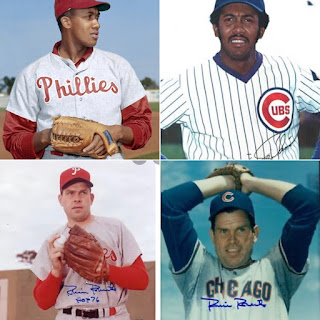The Phillies' Robin Roberts was unquestionably the dominant right-handed pitcher of the 1950s. Another Phillies right-hander, Ferguson Jenkins, became one of the most dominant right-handed pitchers of the late 1960s and early 1970s. Unfortunately, due to an ill-advised trade, Jenkins' brilliance was put on display in Chicago rather than Philadelphia. By an odd coincidence, Roberts and Jenkins paths crossed in Chicago in 1966. It was Jenkins' first full season in the majors and Roberts' last.
In the spring of 1966, the Phillies were in "win now" mode, after falling disastrously just short of the pennant in 1964 and then plummeting to sixth place in 1965. In an attempt to add some veteran starting pitching, the Phillies sent the promising Jenkins (along with young outfielder Adolfo Phillips and first baseman John Herrnstein) to the Cubs for veteran pitchers Larry Jackson and Bob Buhl. Jackson pitched pretty well for the Phillies for three seasons. Buhl was washed up and gone after little more than one season. Meanwhile Ferguson Jenkins became the ace of the Chicago staff, reeling off six consecutive 20-win seasons from 1967-1972, just as Roberts had done for the Phillies form 1950-1955. As it turns out, Jenkins's career as a starter with the Cubs got a kickstart from none other than Robin Roberts.
The Jenkins trade happened early in the 1966 season, on April 21, but at first veteran Cubs' manager Leo Durocher didn’t seem to know how to use his new acquisition. Jenkins pitched almost exclusively out of the bullpen and was not pitching particularly well. After a poor relief outing on July 9 against the Phillies, Jenkins ERA stood at 4.25. Fate then intervened. On July 7, the Houston Astros waived the 39-year-old Roberts, and Durocher, dissatisfied with his starting pitching, hired him to be a player/coach.
Roberts reported to the Cubs just after the All-Star break. In his biography Throwing Hard Easy, Roberts tells what happened next.
I joined the club during the All-Star break. The White Sox and Cubs used to play an exhibition game the day after the All-Star break, so that was my first day on the job. I was out in the bullpen in Comiskey Park...when a big lanky kid with the Cubs asked if he could throw for me. I said sure because I'd never seen him pitch before. He threw about 10 or 15 pitches and I told him, "You've got to be kidding."
He said, "What do you mean, Coach?"
I said, "I didn't know you threw like this." He had super wrist action and his ball really moved.
"Aw, but I'm not fast enough," the kid said.
I said, "Don't worry, you're plenty fast enough. I used to have that kind of stuff."
The "kid," of course, was Ferguson Jenkins. Roberts could see that Fergie was not yet confident in his stuff and Durocher's handling was not helping him gain confidence. Roberts got him to throw his fastball more, ditch the slider for a while, and go with his curve as a breaking pitch. After a month, Roberts convinced Durocher to give Jenkins a start. Here is Robbie again on what happened next.
Near the end of the year, we went to Atlanta to play the Braves. We started Fergie in that series, his first start in a long time. He beat the Braves 5 to 1, striking out nine and walking only one. He came over to my locker after the game and said, "Hey Coach, I am fast enough."
Roberts replied, "And the right guy [Durocher] knows it now."*
Durocher did indeed know it. After a few more excellent Jenkins starts, Durocher told the Chicago Tribune, "We've found ourselves a real starting pitcher."
They had. Over the next seven years, a confident Ferguson Jenkins won 147 games for the Cubs.
On August 29, Jenkins started against the Atlanta Braves. He pitched very well, allowing just two runs in 8 1/3 innings. He was relieved by Len Church in the ninth and the game eventually went into extra innings. George Altman singled in two runs to win the game for the Cubs in the 14th inning. Jenkins' coach, one Robin Roberts, pitched shutout ball over the last two innings to record the win. It was the 286th and final win of Roberts' great career.
Roberts did not return to the Cubs in 1967. He was invited back as a coach only, but he still wanted to pitch. In the spring, the 40-year-old Roberts hooked on with the Phillies minor league affiliate in Reading hoping to attract a major league offer. That offer never came. While Robbie toiled in the minor leagues, Fergie recorded his first 20 game win season.
Roberts and Jenkins had remarkably similar careers. Robbie won 286 games, while Fergie won 284. Roberts finished with a career ERA of 3.41, Jenkins 3.34. Roberts pitched 305 complete games, Jenkins 267. Both were masterful control pitchers. Roberts was perhaps the greatest control pitcher of all time, walking just 1.7 batters per nine innings over 4,500+ innings. Jenkins walked 2.0 per nine innings. Roberts has a Wins Above Replacement (WAR) score of 83, just a tick above Jenkins' 82.2. Both men were elected to the Hall of Fame.
Years later Roberts, owner of 286 wins, met up with Jenkins at a Hall of Fame function. Roberts said, "Fergie, it sure was nice of you to only win 284."
*Roberts memory here is a little faulty. Jenkins' first start after many months was on August 25 against the New York Mets. Jenkins did pitch very well, winning the game 3 to 2 and striking out six. Four days later came the start against Atlanta.

Lovely story. Thanks, Russ.
ReplyDeleteThank you.
Delete